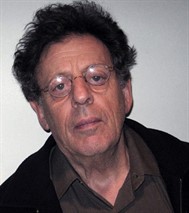| País | Estados Unidos da América |
|---|
| Ocupação | Compositor, Interprete |
|---|
| Categorias | Minimalista |
|---|
Philip Glass is generally regarded as one of the most prominent composers associated with the minimalist school, the other major figures being Steve Reich, Terry Riley, and John Adams. His style is quite recognizable, owing to its seeming simplicity of repeated sounds, comprised of evolving patterns of rhythms, which are often quite complex, and rhythmic themes. In some of his early works, like Two Pages (1967), the whole of the piece evolves from a single unit or idea that expands as notes are added. In later works, expansion comes via the lengthening of note values or through other inventive processes. Many describe his music in the minimalist vein as mesmerizing; others hear it as numbingly repetitive and devoid of variety in its simplicity. The latter view of his style is itself simplistic and fails to take into account the many subtleties and complexities found in his methods. Glass' mature style embraces more than just minimalism and thus must be viewed being more eclectic and far less dogmatic. There is greater emphasis on melody, less on controlling rhythmic patterns. His opera Einstein on the Beach (1975) was the first of an important triology of stage works, the other two being Satygraha (1980) and Akhnaten (1983). He is one of the most popular serious composers of the latter twentieth and early twenty-first centuries.
Glass showed musical talent early on, both on violin and flute. He graduated from the University of Chicago (he moved to Chicago in his teens) at the age of 19. He next enrolled at Juilliard, and had by then rejected serial techniques in composition in favor of more conventional styles, favoring the music of Ives, Copland, and Virgil Thomson. Over the next four years he studied with Persichetti, Milhaud, and Bergsma.
He later studied with Nadia Boulanger in Paris, and it was during this two-year period that he met and worked with sitar player Ravi Shankar, who introduced him to Indian music. He was intrigued by its sound and possibilities and attracted to Asian and Middle Eastern cultures. Eventually, he even converted to Buddhism. Glass later spoke of how greatly his 1966 visit to Tibet influenced his thinking, both musically and spiritually.
After returning to New York in 1967, Glass struggled financially and had to work as a cab driver and plumber for a time. Eventually, he established the Glass Ensemble in the early '70s. This group consisted of seven players and used keyboards, woodwind instruments, and amplification of vocals. Though it also struggled at the outset, it eventually became immensely popular.
Glass' Einstein on the Beach was staged in 1976 and was his first large-scale triumph. By this time, too, his Ensemble was in greater demand, as were a good many of his other works. Since the 1980s, Glass' popularity has grown with the successes of his 1982 Company, for string quartet or string orchestra, the 1987 violin concerto, and the 1997 score, Kundun, written for the Martin Scorsese film. There have been other operas from Glass' pen, including The Fall of the House of Usher and Orphée. Among other works is the remarkable Monsters of Grace, for voices and instrumental ensemble, a mystical composition that uses light and other effects in performance.
Glass has received many awards, among which have been the Chevalier de l'Ordre des Arts et des Lettres in 1995, from the French government. Glass continues to write music and must be regarded as among the most important composers of his time.
by Robert Cummings
